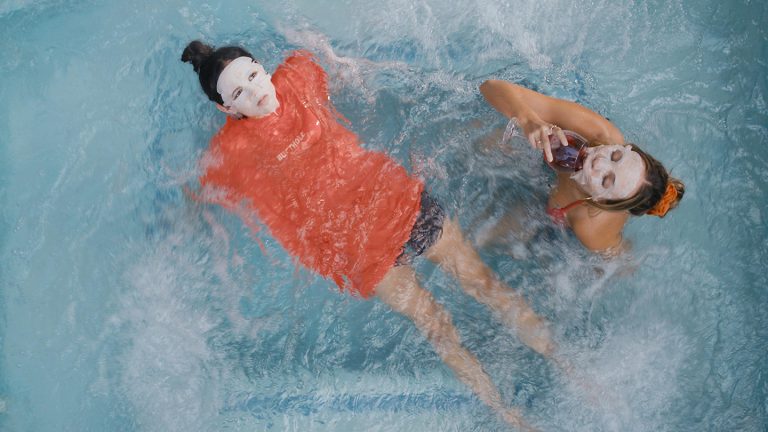The winner for this year’s Narrative Feature Competition was Megan Park’s “The Fallout,” a coming-of-age story about high schoolers trying to go on with their lives after surviving a school shooting. The starkness of the premise is treated with an air not too different than HBO’s “Euphoria,” in facing incredibly difficult subject matter through honest teen dialogue. But the ennui here is all-American, of watching a high schooler process such a traumatic event while the country shrugs its shoulders and moves on.
The first touch in “The Fallout” that shows Park’s special and compelling filmmaking sensitivity is in how she presents the incident, the school shooting that takes place a few minutes into the movie and then rings in your ears for the rest of it. She knows that we don’t need to see violence, or guns, to perceive the complete trauma of the experience, and Park presents the movie with two girls, Vada (Jenna Ortega) and Mia (Maddie Ziegler) in separate bathroom stalls when the shooting starts. Vada crawls into Mia’s stall, and then a shocked schoolmate named Quinton (Niles Fitch) joins them, covered in his brother’s blood. It is a deeply, deeply horrifying moment that accomplishes the horrifically ordinary nature of the event.
From here, the rest of “The Fallout” follows Vada, witnessing her stunted relationships with her family (like her loving parents and her sister, the latter who she was texting right before the shooting) and her friends in a time when she can’t talk about it. On the margins of Park’s character study is the society that normalizes these unfathomable and traumatic experiences to essentially being a part of growing up. Its emotions then work with the more revealing but casual dialogue, like when Vada’s friend Nick speaks casually about what he did with his day—he went to a rally. “It was cool though, they let me speak.” Nick becomes a type of stand-in for the teenagers who are known in the media for their trauma, but Vada is instead representative of those who do not have media attention, and live with it all the same. She goes to the different funerals, she doesn’t know why she survived. She goes to therapy (with Shailene Woodley’s therapist giving Judd Hirsch/“Ordinary People” vibes), and she does not feel anything.
This movie’s ambition is playing in a league different than a great deal of its peers; it starts with a darkness and relevancy a lot of filmmakers spend their careers never wanting to touch. But that also is part of the setback for “The Fallout,” as it becomes all the more obvious when scenes seem to be more powered by the context than much that is revealing. Park’s script wants to sit with someone after this experience and capture their evolution, but sometimes it seems like it wants to simply represent instead of further push us. The tone can be weak in the process; some scenes are simply sad, or others are simply funny, and others are more about hanging out (as with Mia, her new friend) and it’s not certain how strong these script fragments would be without their harrowing context. Any time the story feels simple, it reads like a missed opportunity to engage this extremely complicated experience that we don’t often see through the eyes of someone like Vada.
Even when “The Fallout” is a little too loose, or a little too comfortable in observing instead of making any larger points, it’s filled with strong young performances are full-bodied, and which Park tactfully does not stretch too thin. Ortega in particular has a compelling sardonic quality navigating the world and not directly facing what she experienced, in scenes that are big and not. Park sometimes gives her especially meaningful bits, like midway through when she has an ambitious drug episode during class. It’s a great comedic moment, while tinged with the sadness of where her internalized grief has lead her. But watching Vada slink around her high school on drugs, in a scene that’s played for comic relief, is a brilliant middle-finger to a culture that expects a certain innocence on its youth, while putting them in danger daily.
I did not love “The Fallout” as much as my peers, or the SXSW jury for that matter, but I deeply appreciate it for what it represents, and how it could open the discussion about how our normalization of these shootings is just piling on trauma. And if this is the kind of story that Park tells with her first feature, imagine what American problems she’ll get us talking about with her second film, or her tenth.












